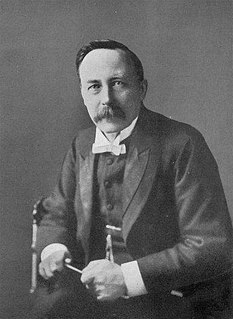A Quote by Charles Spurgeon
If there be a man before me who says that the wrath of God is too heavy a punishment for his little sin, I ask him, if the sin be little, why does he not give it up?
Related Quotes
When a man is in God's grace and free from mortal sin, then everything that he does, so long as there is no sin in it, gives God glory and what does not give him glory has some, however little, sin in it. It is not only prayer that gives God glory but work. Smiting on an anvil, sawing a beam, whitewashing a wall, driving horses, sweeping, scouring, everything gives God some glory if being in his grace you do it as your duty.
Wrath, unlike love, is not one of the intrinsic perfections of God. Rather, it is a function of God's holiness against sin. Where there is no sin, there is no wrath-but there will always be love in God. Where God in His holiness confronts His image-bearers in their rebellion, there must be wrath, or God is not the jealous God He claims to be, and His holiness is impugned. The price of diluting God's wrath is diminishing God's holiness.
Little sins carry with them but little temptations to sin, and then a man shews most viciousness and unkindness, when he sins on a little temptation. It is devilish to sin without a temptation; it is little less than devilish to sin on a little occasion. The less the temptation is to sin, the greater is that sin.
The magnitude of the punishment matches the magnitude of the sin. Now a sin that is against God is infinite; the higher the person against whom it is committed, the graver the sin-it is more criminal to strike a head of state than a private citizen-and God is of infinite greatness. Therefore an infinite punishment is deserved for a sin committed against Him.
The cliché, God hates the sin but love the sinner, is false on the face of it and should be abandoned. Fourteen times in the first fifty Psalms alone, we are told that God hates the sinner, His wrath is on the liar, and so forth. In the Bible, the wrath of God rests both on the sin (Romans 1:18ff) and on the sinner (John 3:36).
A man who fears not God, will break all his laws with an easy conscience, but one who is the favorite of heaven, who has been indulged to sit at royal banquets, who knows the eternal love of God to him, cannot bear that there should be any evil way in him that might grieve the Spirit and bring dishonor to the name of Christ. A very little sin, as the world calls it, is a very great sin to a truly awakened Christian.
St. Augustine and St. Thomas define mortal sin to be a turning away from God: that is, the turning of one's back upon God, leaving the Creator for the sake of the creature. What punishment would that subject deserve who, while his king was giving him a command, contemptuously turned his back upon him to go and transgress his orders? This is what the sinner does; and this is punished in hell with the pain of loss, that is, the loss of God, a punishment richly deserved by him who in this life turns his back upon his sovereign good.
God has decided the rules of life, whereby you don't trespass on anybody else's rights, and sin is something that upsets the balance of things. There are three types of sin: sin against yourself; sin against other people; and sin against God. People often sin against themselves and others and misbehave with God, too.
It is no strain of metaphor to say that the love of God and the wrath of God are the same thing, described from opposite points of view. How we shall experience it depends upon the way we shall come up against it: God does not change; it is man's moral state that changes. The wrath of God is a figure of speech to denote God's unchanging opposition to sin; it is His righteous love operating to destroy evil. It is not evil that will have the last word, but good; not sorrow, but joy; not hate, but love.



































